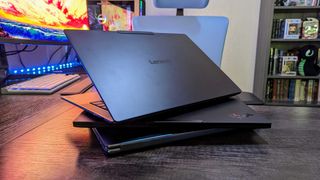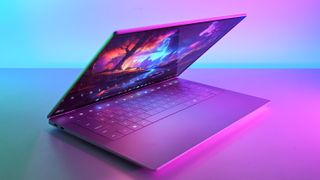
While buying one of the best Windows laptops new from the assembly line is an exciting experience, the second-hand market is thriving. Those who don't want to pay full price can check out promotions at manufacturers and third-party sites, but even then you might not be getting the best deal possible.
Buying a used laptop might come with more risks, but it's a great way to land your desired PC for the lowest price possible. It also helps eliminate e-waste, which is always a good thing in a world filled with disposable tech.
I've bought and sold plenty of second-hand laptops over the years, and I've boiled down my experiences into 11 useful tips. These should help set you up for success throughout the entire process, including before you buy, while you're buying, and after you buy.
What to do before you buy


The process of buying a used laptop begins long before you actually receive the PC, whether first-hand or through an official refurbished retailer. Here are a few things you should sort out to begin.
1. Decide what type of laptop you need
Why you can trust Windows Central
Knowing exactly what sort of laptop you need is the first thing I always recommend. Laptops come in all shapes and sizes, with different displays, different performance hardware, and different features. While it might be impossible to keep track of everything down to the screws, having a solid idea of what you need will ultimately save you time.
For example, you might want a convertible or 2-in-1 laptop if you enjoy using a tablet from time to time. If you're buying a laptop for gaming or for demanding workloads, a thicker laptop with a discrete graphics card is likely required. If you plan on using the PC for media — I watch 90% of TV and movies from a laptop — an OLED or otherwise high-res screen with HDR might be preferable.
As for performance, you probably don't want to shop for a processor from beyond the past three or four generations. This not only ensures you have enough power to keep up with common modern applications, but it also ensures the rest of the laptop isn't beyond five or so years old.
Intel's 11th Gen chips might be enough if you find a great deal, but I'd lean more toward 12th, 13th, or Core Ultra 100 series. As for AMD, Ryzen 6000, 7000, 8000, and Ryzen AI 300 chips should all be safe bets. Aim for at least 8GB of RAM (16GB is better) and an M.2 PCIe NVMe solid-state drive (SSD) with enough capacity for your data.
Pro tip: Set a budget and try to stick to it. You'll be much happier if you don't overspend even though it might take you longer to find the right laptop.
2. Browse local or reputable sources
Buying a product second-hand always comes with some risk, but there are ways to mitigate it. If you're buying from a private seller in person, many of the tips in the next section apply.
If, instead, you're buying from an auction house like eBay or Swappa where you can't test the product first-hand before buying, you'll at least get some buyer protections that you won't find in places like Craigslist (or Kijiji, the Canadian equivalent).
Sites like Newegg, Best Buy, and Amazon allow third-party sellers to promote their wares, but they also have certified refurbishment programs. Taking Newegg as an example, its refurbished products are those that were returned or never used; they receive a letter grade based on their condition following a thorough inspection.
3. Compare prices with new hardware
There's no sense in buying a used laptop if you can find a similar new model for as much or only slightly more. Compare the laptop specs carefully to see if there are any major indicators for pricing, and don't be scared to reach out to the seller to ask extra questions.
The seller might even be willing to drop the price if they realize that they're trying to sell a used laptop for the same price as a similar new laptop.
What to do while you're buying
Most of the following tips only apply if you're buying privately and in person. If you're buying from a refurbished program at a major retailer, these things will usually be considered and any problems addressed when the laptop undergoes the revitalization phase.
Beyond the following steps, it's worth checking to ensure the OS is activated (and is actually a genuine copy), and it's worth ensuring the Wi-Fi/Ethernet port works.
4. Check the body and ports for damage


Any major damage to the exterior of the laptop is usually a sign that it hasn't been properly cared for. The same goes for a laptop that looks like it's never been cleaned.
Ports are also a key area for hidden damage. Inspect for any evident damage to ports (including clogged inputs) and, if possible, plug in some accessories to make sure everything is in working order.
5. Verify the screen quality and resolution
You should already know what resolution and panel type you want, but be sure to verify it's what the seller claims. It's easy to confuse QHD, OLED, IPS, and all the other acronyms that go with display tech, and even honest sellers might not have advertised accurately.
Crank the screen brightness up to see if it's bright enough for your liking; this is also a great time to check for any backlight issues or dead pixels. Stay away from a screen that flickers or has noticeable damage.
6. Type some words and use the touchpad
A keyboard can easily hide sticky or broken keys, and the best way to test is to open a blank Notepad page and type some words. Be sure to hit the keys you don't normally use in everyday typing to ensure they still work. If the laptop has a backlight, be sure it's still in working order.
The same advice stands for the touchpad. Click around along the outer edges as well as the center to feel for any sticky points or loose parts.
7. Turn on the webcam and play some music


Just because a laptop has a camera and speakers doesn't mean they're up to your standards or even in working order.
All you need to do is open the Windows camera app to check the webcam's quality; you can also test the camera shutter (assuming the laptop has one) to ensure it still works.
For speakers, I usually open a browser tab and play a video on YouTube. Test for crackling or distortion at higher volumes. If you're meeting someone in person in a place without Wi-Fi, consider loading a video or some music on a USB drive to bring along with you.
8. Check the Windows battery report and hardware specs
As with the display, sellers can easily confuse the performance hardware inside the laptop. Be sure to verify the PC's hardware before closing a sale. Our complete guide to checking hardware specs in Windows 11 can help you through the process.
While replacement batteries usually aren't too expensive — I've salvaged an otherwise relevant laptop a couple of times for about $60 — you don't want to buy a laptop that immediately needs more money. A quick and easy way to check battery health is by using the Windows battery report tool. Follow our guide on how to generate a battery report in Windows to get a detailed reading.
9. Ask for a receipt and warranty information
There's no harm in asking the seller for a receipt for the laptop. This helps prove the laptop was purchased in good faith, and it can also provide some retailer information.
If the laptop isn't particularly old, be sure to also ask for warranty information. You might get lucky with a used laptop still under coverage.
What to do after you buy

You bought a used laptop and it's now sitting in front of you at home or at the office. The buying process isn't quite wrapped up, as there are a couple more tips to ensure you get the best experience possible.
10. Upgrade drivers and software, run benchmarks
The previous owner of your laptop might not have bothered to update Windows, so be sure the OS is as up-to-date as possible. You also want to make sure you have the latest drivers for the PC, whether through Windows or third-party manufacturer outlets.
It's also a good idea to run some benchmarks on the PC to ensure it's running optimally. Compare your results against results found in corresponding reviews. This is particularly important in gaming or creator laptops that run hot; the CPU thermal paste has a tendency to dry out and cause performance problems.
11. Clean your new (used) laptop
Cleaning the outside of your new (used) laptop when it arrives is always recommended, but don't ignore the inside.
You have no idea how the laptop was treated or where it lived in its past life, and it might be clogged up with dust and detritus. If you're comfortable taking the laptop's bottom panel off — our favorite laptop upgrade tools can help — you can clean out the fans and mainboard with some compressed air.
What to avoid when buying a used laptop
One of the most important pieces of advice when buying a used laptop is if it seems too good to be true it probably is. Be wary of scams and don't be afraid to demand further proof.
Before arriving at that point, I recommend staying away from sellers with poor reputations, overly grimy devices, and laptops beyond a certain age. Try to buy something from within the last four or five years to avoid buying a PC that's barely relevant when it arrives.
Get the Windows Central Newsletter
All the latest news, reviews, and guides for Windows and Xbox diehards.

Cale Hunt brings to Windows Central more than eight years of experience writing about laptops, PCs, accessories, games, and beyond. If it runs Windows or in some way complements the hardware, there’s a good chance he knows about it, has written about it, or is already busy testing it.